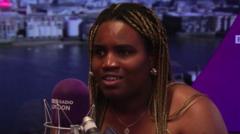Was a Visually Impaired Beyoncé Fan Dehumanized at the Concert?

Understanding the Experience of Visually Impaired Concertgoers: A Case Study
The world of live music is a vibrant tapestry of sound, emotion, and connection. For many, concerts represent a significant cultural experience, a chance to share moments with friends and enjoy the artistry of their favorite performers. However, for individuals with disabilities, particularly those who are visually impaired, accessing these events can often present challenges that go beyond mere inconvenience. This article delves into the recent experience of Esther Obigbesan, a visually impaired Beyoncé fan, and highlights the critical importance of accessibility in live events.
Esther Obigbesan’s Experience at the Beyoncé Concert
Esther Obigbesan, who spent £489 on a standing VIP ticket for Beyoncé's concert at the Tottenham Hotspur Stadium, faced a troubling situation that many might not consider when thinking about concert accessibility. Upon arrival, despite having made her disability needs known prior to the event, Esther was informed that she would need to surrender her long cane—an essential mobility aid—to access the VIP area. Staff described her cane as a "health and safety risk," leading to a deeply frustrating and dehumanizing experience.
Esther's journey began with an attempt to communicate her access needs ahead of the concert. Unfortunately, her requests went unanswered, highlighting a significant gap in communication between ticket vendors and venue staff. This lack of response set the stage for a series of misunderstandings and ultimately a distressing encounter at the concert.
The Impact of Miscommunication
Upon reaching the VIP check-in point, Esther received her wristband and merchandise without incident. However, when she attempted to proceed to the pitch area, security staff intervened, insisting that she could not enter with her cane. Esther's attempts to clarify that the cane was a visual aid and did not impede her mobility were met with resistance, as staff maintained the stance that walking aids were prohibited in standing sections.
This situation escalated to the point where Esther felt compelled to surrender her cane to the medical team just to gain access to the event. This moment is significant; it was not just about the cane but about her confidence and independence. The experience was dehumanizing, stripping Esther of the autonomy she required to navigate the venue safely and comfortably.
The Aftermath: Emotional and Physical Displacement
After finally being allowed into the concert area, Esther faced further challenges. She required assistance finding the restroom, and during her visit, she overheard security staff discussing her situation. They expressed concerns about her safety, stating that others would not recognize her visual impairment without her cane. This lack of understanding of her needs further compounded her distress.
Eventually, Esther was relocated to a seated area two levels above her original placement, significantly diminishing her experience of the concert. She described the emotional toll this episode took on her, stating, "It's a three-hour show but I barely remember any of it because I was crying so much." This statement encapsulates the profound impact that inadequate accessibility can have on individuals with disabilities, turning an anticipated event into a source of trauma.
Addressing Accessibility Failures
In the wake of this incident, Tottenham Hotspur publicly apologized to Esther, refunded her ticket, and admitted that her experience did not meet the venue's standards. The club acknowledged that their actions fell short and that the situation was not reflective of the VIP package she had purchased. This response is crucial in recognizing the need for better communication and training among staff regarding accessibility issues.
Leigh Luke, the customer services operations manager at Tottenham Hotspur Stadium, emphasized the importance of understanding and communicating with patrons directly. He noted the club's commitment to improving steward training and updating communication protocols for ticket holders. Such steps are essential in ensuring that future attendees with disabilities do not face similar challenges.
The Importance of Inclusivity in Live Events
The experience of Esther Obigbesan serves as a crucial reminder of the importance of inclusivity in live events. It highlights the need for venues to adopt comprehensive accessibility policies that ensure all patrons, regardless of their physical abilities, can enjoy events without facing undue barriers.
Key Aspects of Accessibility
To foster a more inclusive environment, venues should consider the following key aspects of accessibility:
- Clear Communication: Ensure that all staff are trained to understand and respect the needs of patrons with disabilities. This includes proper training on how to communicate effectively and sensitively with individuals who may require assistance.
- Accessibility Information: Provide clear and accessible information about the venue's facilities and accessibility options on websites and promotional materials. This should include details on seating arrangements, restroom accessibility, and available aids.
- Flexible Policies: Establish policies that allow for reasonable accommodations, such as permitting necessary mobility aids, to ensure that all patrons can safely access the venue.
- Feedback Channels: Create avenues for patrons to provide feedback on their experiences. This input is invaluable in identifying areas for improvement and ensuring that all voices are heard.
Legal Obligations and Standards
In many regions, venues are required by law to adhere to accessibility standards, such as the Americans with Disabilities Act (ADA) in the United States or the Equality Act in the UK. These regulations mandate that public spaces must be accessible to individuals with disabilities, which includes providing reasonable accommodations to ensure equal access to services and facilities.
Moving Forward: Creating a Culture of Inclusion
As society continues to progress toward greater inclusivity, it is vital that the live entertainment industry keeps pace. The experience of individuals like Esther Obigbesan should serve as a catalyst for change, prompting venues to reassess their policies and practices to ensure they cater to all patrons. Inclusivity in live events is not merely a legal obligation; it is a moral imperative that enriches the cultural landscape for everyone involved.
Encouraging Change in the Live Music Industry
To create a culture of inclusion within the live music industry, several proactive steps can be taken:
- Advocate for Policy Changes: Encourage industry stakeholders to adopt more inclusive policies that prioritize the needs of individuals with disabilities.
- Promote Awareness: Engage in community outreach and educational initiatives to raise awareness of the challenges faced by individuals with disabilities in accessing live events.
- Collaborate with Advocacy Groups: Partner with organizations that specialize in disability advocacy to develop best practices for accessibility in the entertainment sector.
Conclusion
The experience of Esther Obigbesan at the Beyoncé concert serves as a critical reminder of the ongoing challenges faced by individuals with disabilities in accessing live events. As we reflect on her story, it is essential to recognize that inclusive practices must be woven into the fabric of the entertainment industry. By prioritizing accessibility, venues can ensure that all patrons have the opportunity to enjoy the joy of live music without facing barriers that compromise their dignity and autonomy.
FAQs
What are the key challenges faced by visually impaired concertgoers?
Visually impaired concertgoers often face challenges related to communication, navigation, and the availability of necessary mobility aids. Misunderstandings about the use of mobility aids can lead to exclusion from certain areas of the venue.
How can venues improve accessibility for patrons with disabilities?
Venues can improve accessibility by implementing clear communication protocols, providing comprehensive information about accessible facilities, and ensuring staff are trained to assist individuals with disabilities effectively.
What legal obligations do venues have regarding accessibility?
Many venues are required to comply with accessibility laws, such as the ADA in the United States or the Equality Act in the UK, which mandate that public spaces must be accessible to individuals with disabilities.
As we move towards a more inclusive future, how can you contribute to making live events more accessible for everyone? #AccessibilityMatters #InclusionInEvents #LiveMusicForAll
Published: 2025-07-21 21:42:12 | Category: technology



